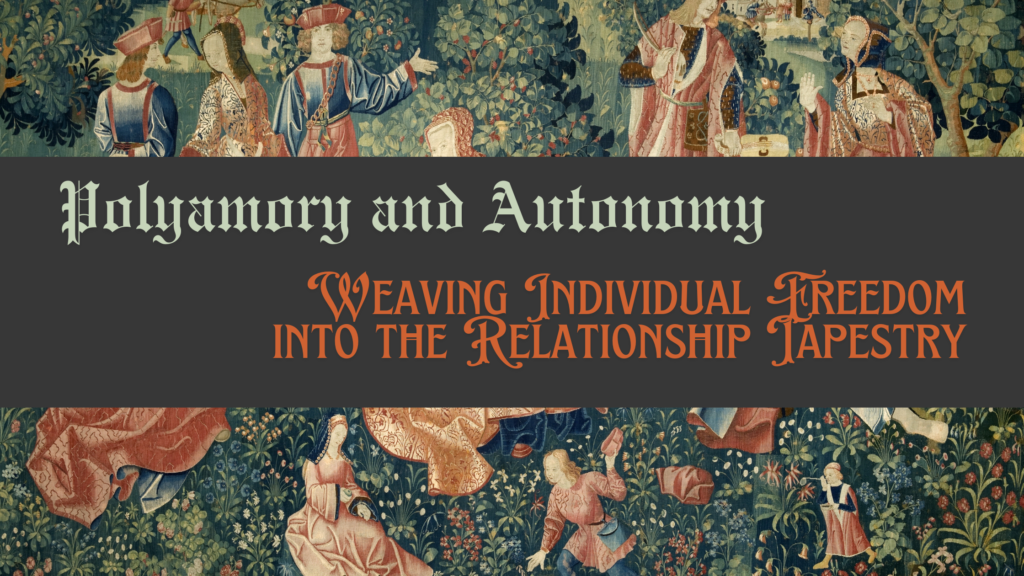
Relationships are a delicate dance between connection and independence, a balance that polyamory challenges us to explore in new ways. When we talk about autonomy in polyamory, we’re looking at how individual freedom shapes—and is shaped by—the bonds we share. It’s a journey that requires honesty, self-reflection, and a deep commitment to nurturing both ourselves and our partners.
In a polyamorous relationship, autonomy isn’t about living in separate worlds; it’s about embracing each person’s unique rhythm within a shared space. Imagine each partner as a distinct melody in a complex piece of music. Some parts are louder, others softer, and yet each one brings something essential to the harmony. Autonomy in polyamory asks us to honor our own needs and dreams while staying open to the needs and dreams of others.
The Balance of Individual Freedom and Connection
Polyamory, at its best, is like weaving a rich tapestry where each thread holds its own color and texture, yet together, they create a cohesive whole. Autonomy in this context means allowing each partner to bring their full, unfiltered self into the relationship while respecting the boundaries and commitments that keep the fabric strong. It’s about cultivating a space where each person can shine as an individual without losing sight of the collective bond.
This balance doesn’t come easily. It requires mindful communication and a willingness to address the complexities of jealousy, fear, and insecurity—emotions that arise naturally when we open our hearts to multiple people. Autonomy within polyamory invites us to face these emotions head-on, acknowledging them without letting them control us. It’s a reminder that our partners’ independence isn’t a threat; it’s a testament to the trust we’ve built.
Communication as the Cornerstone of Autonomy
For autonomy to thrive in polyamory, communication has to be more than just an exchange of words; it has to be a practice of transparency, vulnerability, and mutual respect. In a relationship structure that values individual freedom, open dialogue becomes the bridge that connects us. Conversations about boundaries, desires, and insecurities need to be ongoing—not as a chore, but as a shared commitment to understanding each other’s evolving needs.
Navigating autonomy in polyamory isn’t about creating rigid rules or guidelines; it’s about developing a shared understanding of what each person needs to feel safe and valued. This process often involves trial and error, gentle recalibration, and a willingness to revisit difficult conversations. It’s through these dialogues that we learn to support each other’s freedom without compromising our own emotional security.
Autonomy Requires Responsibility
Autonomy is a powerful force, but it also comes with responsibility. In a polyamorous relationship, embracing autonomy means acknowledging that our actions and choices impact more than just ourselves. It’s about understanding that while we have the freedom to pursue our own interests, we also have a duty to honor the commitments we’ve made to our partners.
Think of autonomy in polyamory as a shared blueprint, a guide that helps us build relationships where each person’s needs are respected and met. It’s not about pushing for total independence; it’s about crafting a structure where everyone feels valued and supported. This responsibility doesn’t limit freedom; it enriches it, creating a foundation where each person can explore their individuality within a context of care and respect.
Embracing Individuality While Building Connection
As we weave autonomy into the tapestry of our relationships, it’s important to remember that independence and connection don’t have to be at odds. Polyamory invites us to embrace both—allowing each person to grow and explore while staying deeply connected to one another. It’s a journey that requires patience, compassion, and a deep respect for the diversity of experiences and emotions that each partner brings to the relationship.
Autonomy in polyamory is a powerful practice of self-love and mutual respect. It’s a way of saying, “I honor my own needs, and I honor yours.” It’s about finding a rhythm that allows each person to thrive individually while nurturing the bonds that hold us together. As you explore this balance, may you find joy in the journey, strength in your connections, and peace in the knowledge that autonomy and love can coexist, each enhancing the other.
